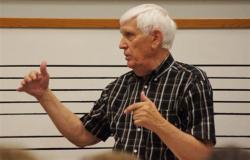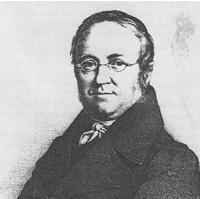Planning worship?
Check out our sister site, ZeteoSearch.org,
for 20+ additional resources related to your search.
- |
User Links
Person Results
Henry K. Oliver
1800 - 1885 Person Name: H. K. Oliver Composer of "MERTON" in Gloria Deo Henry Kemble Oliver (b. Beverly, MA, 1800; d. Salem, MA, 1885) was educated at Harvard and Dartmouth. He taught in the public schools of Salem (1818-1842) and was superintendent of the Atlantic Cotton Mills in Lawrence, Massachusetts (1848-1858). His civic service included being mayor of Lawrence (18591861) and Salem (1877-1880), state treasurer (1861-1865), and organizer of the Massachusetts Bureau of Statistics and Labor (1867-1873). Oliver was organist at several churches, including Park Street Congregational Church in Boston, North Church in Salem, and the Unitarian Church in Lawrence. A founder of the Mozart Association and several choral societies in Salem, he published his hymn tunes in Hymn and Psalm Tunes (1860) and Original Hymn Tunes (1875).
Bert Polman
Henry K. Oliver
James Nevett Steele
1850 - 1916 Person Name: J. Nevett Steele Composer of "[My God I love thee—not because]" in Hymns and Carols Set to Music
James Nevett Steele
Jack Boyd

b. 1932 Arranger of "KINGSFOLD" in Great Songs of the Church (Revised) Jack Arthur Boyd (b. Indianapolis, Indiana, February 9, 1932) was the music editor of *Great Songs of the Church, Revised*, published by ACU Press in 1986. He earned a B.S. degree in music education from Abilene Christian University, a masters degree in music composition and theory from the University of North Texas, and a Ph.D. in choral literature from the University of Iowa. Boyd edited *Children, Rejoice!* (Sweet, 1979) and he authored *Rehearsal Guide for the Choral Director* (Parker, 1970) and *Leading the Lord's Singing* (Quality, 1981). He is a member of Churches of Christ and lives in Abilene, Texas.
Monty Lynn
Jack Boyd
Raphael Courteville
? - 1772 Person Name: Raphael Courteville, c. 1677-1772 Composer of "ST. JAMES " in Hymnal and Liturgies of the Moravian Church Courteville, Raphael or Ralph (d. 1772), organist and political writer, was the son or grandson of one of the gentlemen of the Chapel Royal who bore the same name, and who died on 28 Dec. 1675. The organ from the Chapel Royal was presented by Queen Mary in 1691 to the church of St. James's, Westminster, and on 7 Sept. in the same year a Ralph Courtaville, who had been strongly recommended by the Earl of Burlington, and who had previously been a chorister in the Chapel Royal, was appointed the first organist, with a salary of 20l. per annum for himself and 4l. for a blower.
This Courteville, Courtaville, or Courtivill, was no doubt the composer of six ‘Sonatas composed and purposley (sic) contriv'd for two flutes,’ published by Walsh about 1690; of a song introduced in Wright's ‘Female Virtuosoes,’ and supposed to have been written by Ann, countess of Winchilsea; of a very graceful song, ‘To Convent Streams,’ in ‘Duke and no Duke,’ and of songs in ‘Oroonoko.’ He was one of the composers who furnished the music for part iii. of D'Urfey's ‘Don Quixote’ in 1695. The well-known hymn tune, ‘St. James's,’ is also by him. It has been supposed that this Courteville died about 1735, and was succeeded by his son of the same name; but as the vestry minutes of the parish, in which all appointments, &c. are carefully recorded, contain no mention of such a change of organists, while no record of the father's death can be found, we are compelled to believe that the existence of the son is a mere assumption, made in order to account for the long tenure of the post by a person or persons of the name of Courteville.
This conclusion is strengthened by various entries in the vestry minutes; in January 1752–3, and again in June 1754, letters are written to him warning him that unless he attends personally to the duties of the post he will be dismissed. Whether he endeavoured to perform the duties himself after this we do not know, but he was certainly not dismissed, and shortly afterwards an assistant, ‘Mr. Richardson,’ was appointed. On 12 June 1771 it was reported to the vestry that Courteville gave this assistant only one quarter of his salary for doing the whole work, and he was thereupon ordered to share the payment equally with Richardson. Seven years before this, in 1764, the assistant, with two others, was consulted as to the state of the organ and the undertaking of repairs to its structure. Neither at this time, nor when the improved instrument, repaired by Byfield, was tried, was Courteville's advice asked in the matter, from which we may conclude that he was long past all work, although he was allowed to keep the post.
This Raphael Courteville, whether or not he be identical with the first organist of the church, took a somewhat active part in politics towards the end of Sir Robert Walpole's administration. He is stated to have married, on 14 Sept. 1735, a lady named Miss Lucy Green, with a fortune of 25,000l. In 1738 he published ‘Memoirs of the Life and Administration of William Cecil, Baron Burleigh, &c., including a parallel between the State of Government then and now,’ with preface and appendix of original papers, dedicated to the Right Hon. Edward Walpole, secretary to the Duke of Devonshire. It is signed only ‘R. C.,’ and was printed for the author in London. He was the reputed author of ‘The Gazetteer,’ a paper written in defence of the government, and it was probably in consequence of this production that he acquired the nickname of ‘Court-evil.’ He also wrote a pamphlet published in 1761, entitled ‘Arguments respecting Insolvency.’ On 4 Dec. 1742 a letter appeared in No. 50 of the ‘Westminster Journal’ bearing his signature, to which were appended the words, ‘Organ-blower, Essayist, and Historiographer.’ The letter was undoubtedly written as a joke, probably upon his own genuine productions; it is of course not by himself, and the point of the joke is impossible now to discover, but the appearance of his name in this connection proves that he was more or less a well-known character. He died early in June 1772, as on the 10th of the month he was buried, and his place was declared vacant at the vestry meeting of that date.
[Grove's Dict. of Music; Hawkins's Hist. of Music; Notes and Queries, 2nd ser. x. 496; Registers and Vestry Minutes of St. James's, Westminster; Cheque-books of the Chapel Royal; Westminster Journal, quoted above; Brit. Mus. Cat.]
--en.wikisource.org/wiki/
Raphael Courteville
E. W. Caswell
Person Name: Edward Caswell Translator (A) of "[My God, I love thee]" in The United Methodist Hymnal Music Supplement II
E. W. Caswell
Johann Georg Frech

1790 - 1864 Person Name: Johann G. Frech Composer of "WITTENBERG" in Book of Worship with Hymns and Tunes Johann Georg Frech (* January 17 1790 in Kaltental, † August 23 1864 in Esslingen am Neckar ) was a German music director, composer and organist.
Naughty was the son of a watchmaker and organ builder. He visited here until his 13th Age of the school, then high school in Stuttgart and took lessons in music.
In 1806 he was teaching assistant in Degerloch while still in Stuttgart, studied music. In 1811 he went as a teaching assistant after Esslingen and in 1812 a music teacher at the newly established Esslinger teacher seminar. In 1820 he received the office of a municipal director of music and organist at the main church in Esslingen, where he remained until his retirement in 1860. His successor was Christian Fink.
Naughty took a significant role in the Württemberg church singing together with Konrad Kocher and Friedrich Silcherstraße one. Together with the aforementioned He created "The Württemberg Choral Book" of 1828 and was co-editor of "Württemberg Choral Book" of 1844.
Frech has composed six symphonies, many choral works, including 22 chorales for Württembergischen chorale books, 67 cantatas, an opera, the oratorio "Abraham on Moriah" and some organ works.
In the district of Stuttgart Kaltental a street was named after naughty.
--de.wikipedia.org/wiki/
Johann Georg Frech
Douglas Fletcher
b. 1844 Person Name: Douglas Fletcher, 1884- Composer of "MOLLESON" in The Methodist Hymnal
Douglas Fletcher


 My Starred Hymns
My Starred Hymns


